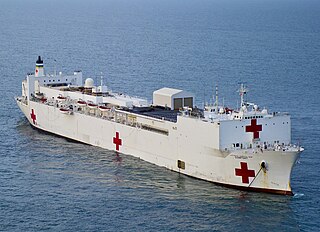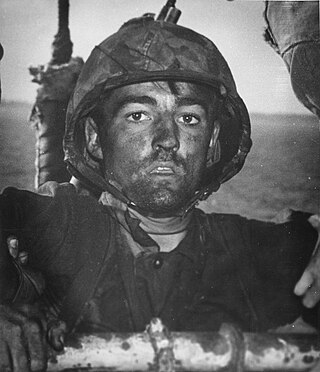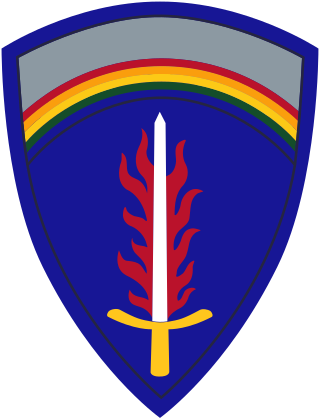Related Research Articles

The National Guard is a state-based military force that becomes part of the U.S. military's reserve components of the U.S. Army and the U.S. Air Force when activated for federal missions. It is a military reserve force composed of National Guard military members or units of each state and the territories of Guam, the Virgin Islands, Puerto Rico, and the District of Columbia, for a total of 54 separate organizations. It is officially created under Congress's Article 1 Section 8 ability to "raise and support armies". All members of the National Guard are also members of the organized militia of the United States as defined by 10 U.S.C. § 246. National Guard units are under the dual control of state governments and the federal government.

The Australian Defence Force (ADF) is the military organisation responsible for the defence of the Commonwealth of Australia and its national interests. It has three branches: the Royal Australian Navy (RAN), Australian Army and the Royal Australian Air Force (RAAF). The ADF has a strength of just over 89,000 personnel and is supported by the Department of Defence and several other civilian agencies.

A veteran is a person who has significant experience and expertise in an occupation or field.

The Australian Army Reserve is a collective name given to the reserve units of the Australian Army. Since the Federation of Australia in 1901, the reserve military force has been known by many names, including the Citizens Forces, the Citizen Military Forces, the Militia and, unofficially, the Australian Military Forces. In 1980, however, the current name—Australian Army Reserve—was officially adopted, and it now consists of a number of components based around the level of commitment and training obligation that its members are required to meet.
An Overseas Service Ribbon is a service military award of the United States military which recognizes those service members who have performed military tours outside the borders of the United States of America. There are different versions of the Overseas Service Ribbons for the U.S. Army, U.S. Navy, U.S. Air Force, U.S. Space Force, and the U.S. Coast Guard. Both the U.S. Navy and the U.S. Marines receive the Navy and Marine Corps Overseas Service Ribbon.

USNS Comfort (T-AH-20) is a Mercy-class hospital ship of the United States Navy.

Combat stress reaction (CSR) is acute behavioral disorganization as a direct result of the trauma of war. Also known as "combat fatigue", "battle fatigue", or "battle neurosis", it has some overlap with the diagnosis of acute stress reaction used in civilian psychiatry. It is historically linked to shell shock and can sometimes precurse post-traumatic stress disorder.
"One weekend a month, two weeks a year" is a former recruiting slogan used by the U.S. Army National Guard. It indicated the amount of time an individual would need to spend actively in the Guard to be a Guardsman with benefits. Though never officially, it was also informally used by Air National Guard, U.S. Army Reserve, U.S. Naval Reserve, U.S. Marine Corps Reserve, U.S. Air Force Reserve and U.S. Coast Guard Reserve personnel in describing their similar military time commitment.

For military personnel, a tour of duty is usually a period of time spent in combat or in a hostile environment. In an army, for instance, soldiers on active duty serve 24 hours a day, seven days a week for the length of their service commitment. Soldiers in World War II were deployed for the entire war and could be in active service for 4–5 years.

In Turkey, compulsory military service applies to all male citizens from 21 to 41 years of age. It is 6 months for all males regardless of education degree. Different rules apply to Turks abroad. For Turks with multiple citizenship, the conscription lapses if they have already served in the army of another country.

The Multi-National Force – Iraq (MNF–I), often referred to as the Coalition forces, was a military command during the 2003 invasion of Iraq and much of the ensuing Iraq War, led by the United States of America, United Kingdom, Australia, Italy, Spain and Poland, responsible for conducting and handling military operations.
On Killing: The Psychological Cost of Learning to Kill in War and Society is a book by Dave Grossman exploring the psychology of the act of killing and the military law enforcement establishments attempt to understand and deal with the consequences of killing. The book is based on S.L.A. Marshall's theory that the majority of soldiers in war do not ever fire their weapons due to an innate resistance to killing.

USS Taluga (AO-62) was a Cimarron-class fleet oiler acquired by the U.S. Navy during World War II. She served her country primarily in the Pacific Ocean Theatre of Operations, and provided petroleum products where needed to combat ships. For performing this dangerous task in combat areas, she was awarded four battle stars during World War II, four during the Korean War, and six campaign stars during the Vietnam War.

The Massachusetts State Defense Force (MSDF) is the currently inactive state defense force of the Commonwealth of Massachusetts. It was inactivated in 2016 by Governor Charlie Baker. The purpose of the Massachusetts State Defense Force, when active, is to augment the Massachusetts National Guard during emergencies in the state, especially when some or all of the National Guard was deployed. The MSDF is an all-volunteer militia which reported to the State Adjutant General and was under the command of the Governor of Massachusetts. Members met for drills one weekend per month unless activated by the Governor during an emergency. The MSDF was headquartered at Milford, Massachusetts, in the same building as the Massachusetts National Guard. The director of the MSDF was appointed by The Adjutant General of Massachusetts (TAGMA). The Massachusetts State Defense Force is authorized by both the Constitution of Massachusetts and chapter 33 § 10 of the Massachusetts General Laws.

Military psychology is a specialization within psychology that applies psychological science to promote the readiness of military members, organizations, and operations. Military psychologists provide support to the military in many ways, including through direct clinical care, consultation to military commanders, teaching others and supporting military training, and through research relevant to military operations and personnel. Military psychology as a field has been growing since the early 20th century, evidence that the demands and needs for psychological clinical and operational application is continuing to grow steadily. There are many stressors associated with military service, including exposure to high-risk training and combat. As such, psychologists are critical support components that assist military leaders in designing appropriate training programs, providing oversight to those programs, and assisting military members as they navigate the challenges of military training and their new lifestyle. Military psychology covers a wide range of fields throughout the military including operational, tactical, and occupational psychology. Gender differences between military-trained personnel who seek mental health assistance have been extensively studied. Specific examples include post traumatic stress disorder (PTSD) associated with combat, or guilt and family/partner difficulties accompanying extended or frequent deployments due to separation. Clinical providers in military psychology are often focused on the treatment of stress, fatigue, and other personal readiness issues. Previous wars such as the Korean war, Vietnam war, and WW 2 provide great insight to the workings and practices of military psychology and how the practices have changed and assisted the military over the years.

The Virginia Air National Guard (VA ANG) is the aerial militia of the Commonwealth of Virginia, United States of America. It is, along with the Virginia Army National Guard, an element of the Virginia National Guard.

United States Army Europe and Africa (USAREUR-AF) is an Army Service Component Command (ASCC) /Theater Army responsible for directing United States Army operations throughout the U.S. European Command (EUCOM) and U.S. Africa Command (AFRICOM) area of responsibility.

United States military veteran suicide is an ongoing phenomenon regarding the high rate of suicide among U.S. military veterans in comparison to the general civilian public. A focus on preventing veteran suicide began in 1958 with the opening of the first suicide prevention center in the United States. During the mid-1990s, a paradigm shift in addressing veteran suicide occurred with the development of a national strategy which included several Congressional Resolutions. More advancements were made in 2007, when the Joshua Omvig Veterans Suicide Prevention Act created a comprehensive program including outreach at each Veterans Affairs Office (VA) and the implementation of a 24-hour crisis hotline. PTSD, depression, and combat-related guilt in veterans are often related to suicide as it can be difficult for veterans to transition to civilian life.

Suicide in the military is the act of ending one's life during or after a career in the armed forces.

Mark Thomas Esper is an American politician and manufacturing executive who served as the 27th United States secretary of defense from 2019 to 2020. A member of the Republican Party, he had previously served as the 23rd U.S. secretary of the Army from November 2017 to July 2019.
References
- ↑ "Ensuring Appropriate Dwell Time and Rotational Cycles". United States Senate. Archived from the original on December 12, 2012. Retrieved December 6, 2012.
- ↑ Larson, Mark (June 29, 2011). "Dwelling on Dwell Time". New York Times. Retrieved 6 December 2012.
- ↑ "Leader Engagement Key to 'Bridging Basics,' Battaglia Says" (Press release). American Forces Press Service. Dec 4, 2012. Retrieved December 6, 2012.
- ↑ Tan, Michelle (4 September 2011). "Dwell time increases to 2 years next month". Army Times. Retrieved 6 December 2012.
- ↑ Johnson, Samantha (July 25, 2012). "'Dwell time' for military to change". The Battalion. Archived from the original on February 19, 2020. Retrieved December 6, 2012.
- ↑ MacGregor, Andrew J.; Peggy P. Han; Amber L. Dougherty & Michael R. Galarneau (2012). "Effect of Dwell Time on the Mental Health of US Military Personnel With Multiple Combat Tours". American Journal of Public Health. 102 (S1): A55–A59. doi:10.2105/ajph.2011.300341. PMC 3496457 . PMID 22390601.
- ↑ "When Warriors Hurt Themselves". New York Times. 2 Sep 2010. pp. A34.